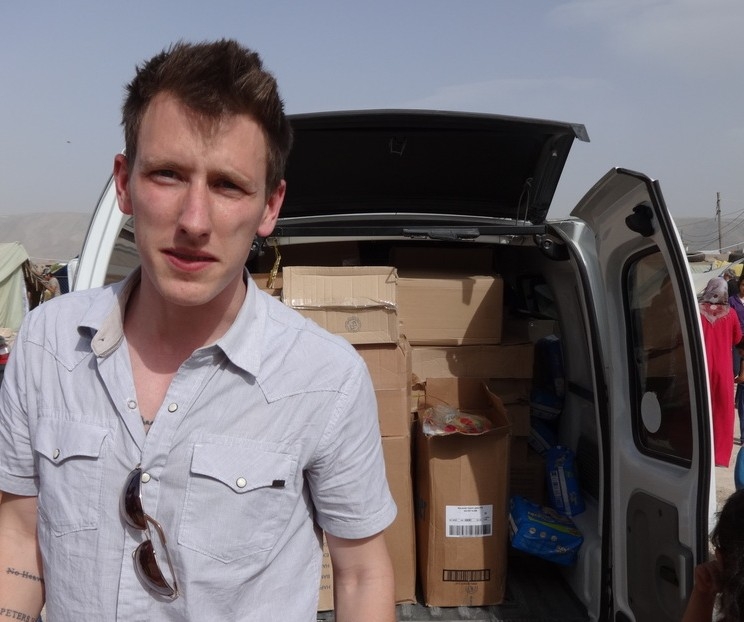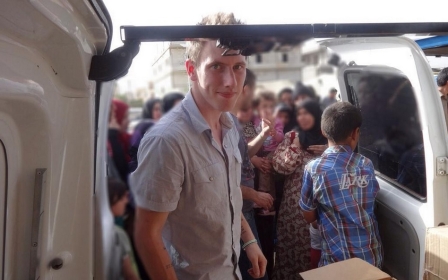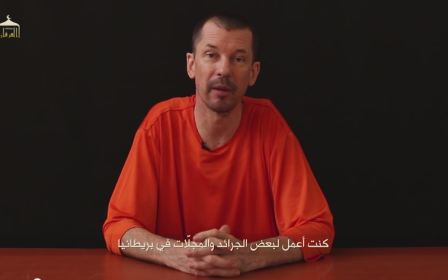The Killing of Abdul Rahman Kassig: Who does IS represent?

The Islamic State has once again acted in contrary to what it stands for. A video was released online from the group on Sunday announcing that it had beheaded American Muslim, Abdul Rahman Kassig.
The 15-minute video shows a masked British jihadist, “Jihadi John,” standing over the severed head of the twenty-six year-old aid worker from Indiana.
Abdul Rahman Kassig, previously known as Peter Kassig, worked for charity organisations in Syria and Lebanon and was captured by the Islamic State militia in October last year. He is also a former American Army Ranger who served Iraq in 2007.
Kassig, who was a Muslim convert, is the latest of five UK and US hostages to have been executed in Syria as part of a propaganda campaign by the Islamic State.
However, what is differentiated this killing from previous IS beheadings was that the victim was not only a Muslim had done incredible work to help relieve the oppressed people of Syria. Kassig established a field hospital in Syria for those who needed it. He also set up training centres to teach the Syrians how to treat the wounded who fell in the battle or those who were victims of Bashar al-Assad’s barrel bombs.
Bilal Abdul Kareem, an American documentary filmmaker who spent two years documenting the lives of foreign fighters, also reported that Kassig was a respected individual by both rebel fighters as well as ordinary Syrian people.
The assassination of Kassig raises an important question, particularly for Muslims: who does this so-called Islamic State actually represent? Kassig’s conversion to Islam and his cause to help others did not save him. This certainly goes in contrary to what the Quran teaches that Islam should protect the lives of every individual regardless of their faiths, let alone Muslims. In addition, if we look at the Islamic history one of the most significant characteristics of Islamic caliphate is protecting people of all faiths within its borders.
Despite using the name “Islamic State” and using the Islamic testimony of faith, the Shahada, and the Prophet Muhammad (peace be upon him) seal on its flag, it does not represent Islam in any shape or form. Although the Quran permits legitimate self-defence, it clearly forbids the murder of civilians, even during wars or conflicts. This so-called Caliphate has no regard for any human life; not for humanitarian workers, not for journalists, and, more signficantly, not for Muslims.
The latest murder will present a dilemma for IS; it will serve to distance the supporters that they have and solidify a growing belief that the Islamic State is far from Islamic teachings. It does not represent a land of safety for both Muslims and non-Muslims. Many Muslim scholars around the world, even those who are currently participating in Jihad in Syria, have also condemned and repudiated the Islamic State’s ideologies.
Kassig sacrificed his life and safety to help and defend the oppressed against injustice. It is now time for us to start speaking out against the ongoing oppressions either perpetrated by the Assad government or the Islamic State. Furthermore, Muslims also need to begin raising awareness that the Islamic State does not in any way represent them or their religion.
At the same time, the international community, especially the Western powers, needs to realise that the Syrian people are in need of real, genuine, and serious efforts to mitigate their ongoing oppressions. Military involvement will not help to relieve the pain of the Syrian people. Rather, it will help to perpetuate anger of extremist groups like IS and more Muslims will undoubtedly flock to IS when more innocent civilians are assassinated and homes are bombed.
Kassig’s beheading is inhumane crime against someone who was willing to sacrifice his life to help those who are in dire need of assistance. His demise is a big loss to the people of Syria, the world, as well as the Muslim Ummah. As a Muslim, my heart breaks at the thought of his death and I pray that the Almighty will reward him for what he has done.
- Muhammad Zulfikar Rakhmat has lived in the Middle East for eight years. He holds a BA in International Affairs from Qatar University and is currently pursuing an M.A. in International Politics at the University of Manchester in the UK. His main areas of concentration are China-Middle East relations, Indonesia-Gulf ties, and Muslim affairs.
The views expressed in this article belong to the author and do not necessarily reflect the editorial policy of Middle East Eye.
Photo: In this Kassig Family released handout photo 4 October, 2014 shows Peter Kassig with a truck were taken somewhere along the Syrian border between late 2012 and fall 2013 as Speical Emergency Response and Assistance (SERA) was delivering supplies to refugees (AFP)
New MEE newsletter: Jerusalem Dispatch
Sign up to get the latest insights and analysis on Israel-Palestine, alongside Turkey Unpacked and other MEE newsletters
Middle East Eye delivers independent and unrivalled coverage and analysis of the Middle East, North Africa and beyond. To learn more about republishing this content and the associated fees, please fill out this form. More about MEE can be found here.




